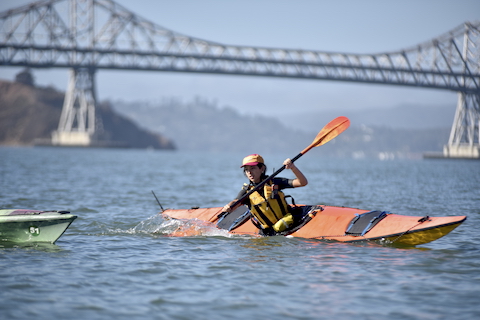
13 Oct Rich City Rays Hosts Training on Water-Based Environmental Protests

The activist group Rich City Rays hosted a training workshop in the waters off the Richmond shoreline on Oct. 4 and 5.
Story and photos by Denis Perez-Bravo
Water plays a central role in the work of Rich City Rays, a Richmond-based group that uses kayaking to bring people together around environmental awareness.
“Being in the water itself is just like a nice connection to the land we’re in,” said Xochitl Chichatl, 28, of San Pablo. “The fact that we live here in the bay, we have this nice connection to it.”
Chichatl joined a recent two-day workshop hosted by the group to learn about kayaking and what organizers call “kayaktivism,” a form of water-based protest that uses kayaks and other small boats as part of nonviolent demonstrations.
- Rich City Rays promotes what it calls “kayaktivism,” a form of water-based protest that uses kayaks and other small boats as part of nonviolent demonstrations.
Kayaktivism began in the Pacific Northwest in the late 2000s through the Backbone Campaign and gained national attention in 2015 when hundreds of kayakers in Seattle protested Arctic drilling as part of the “ShellNo” flotilla.
“One of the things I heard earlier was like one raft against a big boat, right? A big shipment,” Chichatl said. “It’s obviously dangerous, but when you’re in a group, in a big, huge raft of people together, you’re just a lot stronger.”
The Rich City Rays training workshop took place Oct. 4 and 5 along the Richmond shoreline. In the mornings, participants learned beginner and intermediate kayaking skills; in the afternoons, speakers led workshops on organizing and environmental justice.
- Dozens gathered for the Rich City Rays workshops to learn about kayaking, organizing and environmental justice.
Rich City Rays describes itself as a grassroots organization that promotes community education and nonviolent action on climate-related topics. Partner groups include Rich City Rides, Urban Tilth, the Oil and Gas Action Network, the Richmond Our Power Coalition and Idle No More SF Bay.
“I feel like we’re entering an era where direct action’s going to be more important than it was before to confront systems of power,” said Berkeley resident Anya Kushwaha, “especially from an environmental justice perspective.”
Kushwaha said training can help participants stay safe during demonstrations.
“It’s important that we as organizers and people practicing direct action have these skills and know how to keep each other safe,” she said.
- Part of the Rich City Rays workshop focused on teaching people how to stay safe while demonstrating in the water.
Ayikwe “Kwictime” Scott, 44, of Oakland, joined the training to build teamwork skills and confidence on the water.
“Getting a feel of being with others and working together in a tandem boat, that was the main part for me,” Scott said.
Participants practiced a range of kayaking techniques, including forward and backward strokes, sweeping turns, draw strokes for side movement and sculling strokes for balance. They also worked on paddling in formation and raising banners from the water.
- As part of the workshop, Rich City Rays trainees learn to kayak in formation and work together to raise banners while in the water.
“And one thing that I like about the activist part is that we got to learn how to work together,” Scott said. “We’ll be together, but we have to learn how to calibrate and function together to operate more smoothly.”



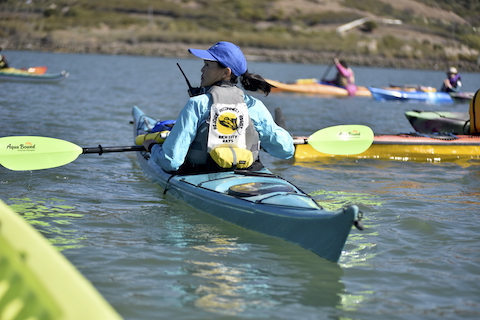
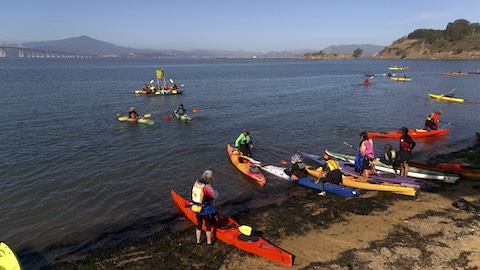
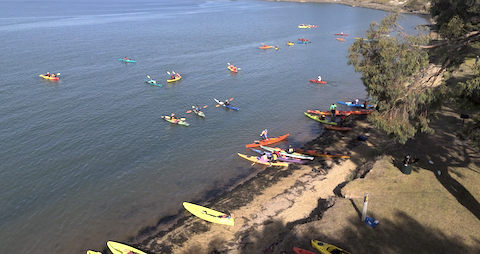
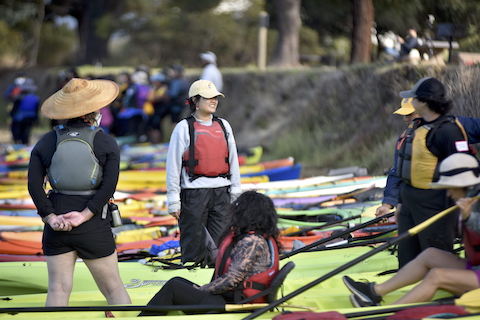
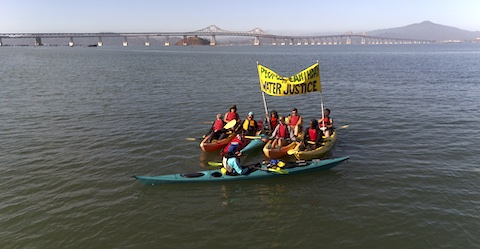
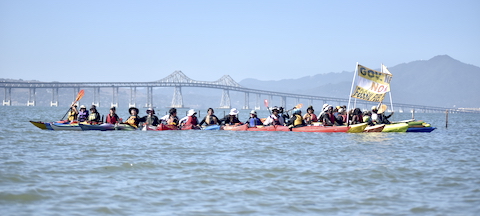



No Comments